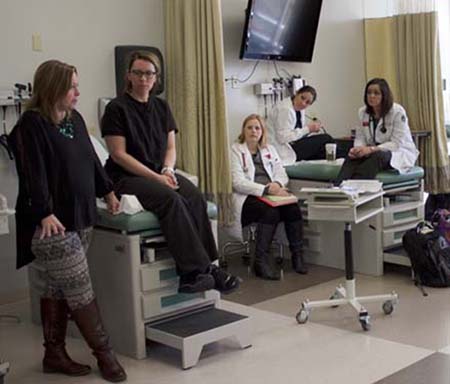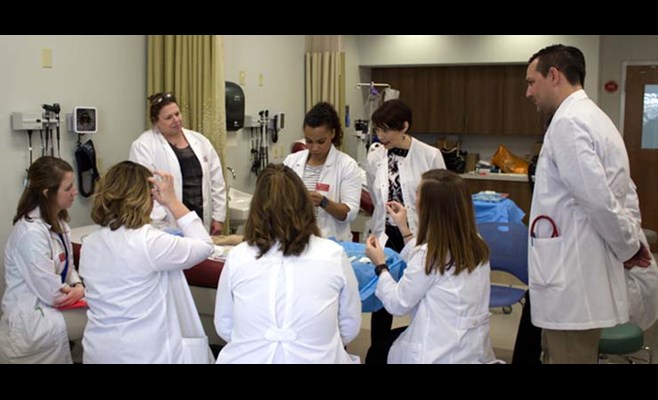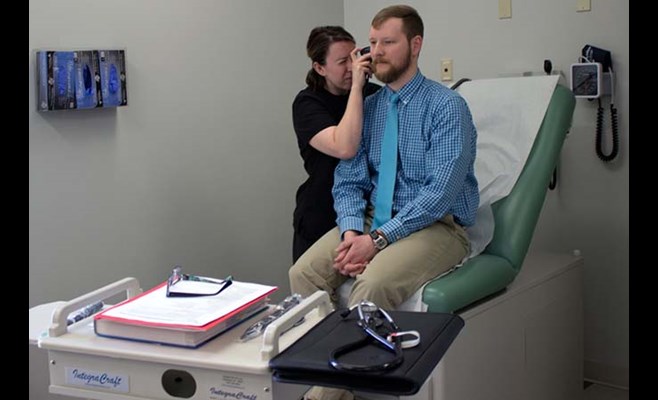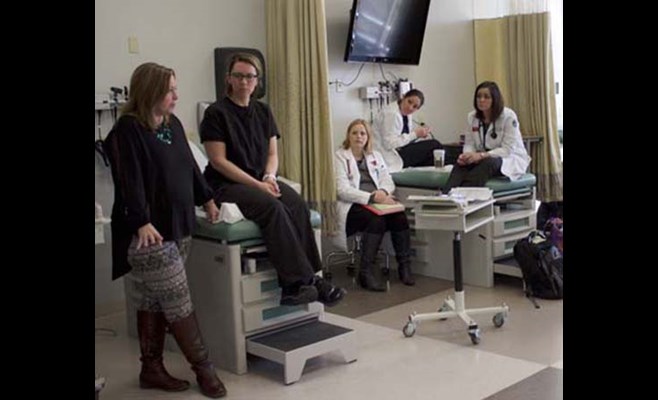
Online nursing students from as far away as California gathered at the University of Arkansas in February to get hands-on health assessment training and to demonstrate critical care procedures performed by nurse practitioners in the acute care setting, a part of the coursework for doctoral and some master's degree students.
The two-day session was the first time the Eleanor Mann School of Nursing brought its advanced health assessment students in the Doctor of Nursing Practice (DNP) program to campus for hands-on, interactive training. The DNP program, which began in Fall 2013, offers concentrations in Adult-Geriatric Acute Care Nurse Practitioner (AGACNP) and Family Nurse Practitioner (FNP).
The 23 doctoral students and three master's degree students who attended the training are in the advanced health assessment course taught by Angela Stewart, who is one of the school's first DNP graduates.
"It is essential for students to travel to campus in order to develop rapport with faculty," Stewart said. "The site visit allows students to demonstrate their knowledge so that faculty can evaluate the skills they have learned and to instill confidence in those skills as a nurse practitioner.
"This translates into better service within the community, and improved patient outcomes," Stewart said. "As a nurse practitioner student, I had the same opportunity with my faculty, and I felt it made me a better provider. The majority of the course work is online. However you cannot replace hands-on learning with standardized patients who are teaching assistants."
Many assessment participants are seeking doctoral degrees in advanced practice nursing to have a greater impact in medical care, they said. Certified Nurse Practitioners (CNPs) can diagnose patients, write prescriptions, perform procedures and make other immediately actionable decisions. While master's-prepared CNPs are able to perform these tasks, EMSON has initiated the DNP outcome to better prepare the doctoral graduates for evidence-based solutions to improve the quality of health care.
"I'd like to be able to make the judgment call," said Rebecca Hulsey, a nurse in the University of Arkansas for Medical Sciences cardiac unit in Little Rock. "When you have a DNP degree, you become an equal member of the treatment team. It's time now that nurses stepped up in health care."
Students spent the first training day at the UAMS facility in Fayetteville, where they conducted breast, prostate, testicular, and pelvic exams on teaching assistants employed as live medical models.
"They are going above and beyond with skills day," said Timothy Horttor from Anaheim, California, a part-time student who hopes to graduate in May 2017.
Stewart said, "We were blessed to have this opportunity for 12 students through a Workforce Development grant, and UAMS graciously donated the standardized patients for the remaining students so that everyone who attended would have the opportunity to perform these exams. I am so pleased with the students' performance of these skills and their appreciation of this opportunity."
During the session's second day, Advanced Health Assessment students gathered at the U of A Epley Center for Health Professions to practice general head-to-toe assessments, using one another as models during examinations of the head, eyes, ears, nose, throat, heart, lungs, and abdomen.
The acute care/critical care track students huddled around artificial limbs to practice inserting central intravenous catheters and arterial lines which are used to help monitor critically ill patients in the ICU. They practiced intubation (artificial airway for ventilators), as well as inserting chest tubes and performing lumbar punctures. These are all required procedures performed by adult-geriatric acute care nurse practitioners (AGACNPs).
Each of the critical care students was assigned a particular procedure in which they were the expert, created a poster presentation, and demonstrated the correct technique for that procedure to the other students. Students were required to perform a return demonstration of the skill correctly to meet the requirement.
"This is so critical to their advanced training," said Dr. Debbie Shirey, the EMSON graduate program coordinator who participated in the training.
Standing inside a classroom filled with hospital beds, Shirey pulled back her hair and pointed to a spot on the back of her neck, instructing doctoral student Jonathan Miller of Texarkana on how to find her posterior cervical lymph node.
"If that node is swollen, it could indicate an infection," Shirey told Miller.
Last week's training brought Horttor from California to Fayetteville for the second time since he started the doctorate program in 2013.
"For me it's not a hardship; it's the education," Horttor said. "It's money well spent. If it's going to give me the confidence I need to work with patients, it's well worth it."
Topics
Contacts
Kay Murphy, director of communications
Global Campus
479-575-6489, ksmurphy@uark.edu


